Thesaurus : Doctrine

► Full Reference: Marty, F., The Case for Compliance Programs in International Competitiveness: A Competition Law and Economics Perspective, in Frison-Roche, M.-A. (ed.),Compliance Monumental Goals, series "Compliance & Regulation", Journal of Regulation & Compliance (JoRC) and Bruylant, to be published.
____
► Article Summaryésumé de l'article (done by the Journal of Regulation & Compliance): The author analyzes economically the question of whether the compliance programs set up to respect competition rules are for the sole purpose of avoiding sanctions or also contribute to the goal of increasing the international economic performance of companies. which submit to them.
The author explains that companies integrate by duplication external standards to minimize the risk of sanctions, developing a "culture of compliance", which produces their competitiveness increase and the effectiveness of the legal and economic system. In addition, it reduces the cost of investment, which increases the attractiveness of the company.
In this, this presentation based on the postulate of the rationality of companies and investors, compliance programs can fall under self-regulation. The duplication of the law that they operate takes place largely according to "procedural" type methods.
____
📝 go to the general presentation of the book 📘Compliance Monumental Goals, in which this article is published
________
Thesaurus : Doctrine
Référence Complète : Europe Economics, Etat des lieux et perspectives des programmes de conformité, Etude réalisée pour le Conseil de la Concurrence, 2008.
Thesaurus : Doctrine
Référence complète : Boy, , "Réflexion sur le "droit de la régulation". A propos du texte de Marie-Anne Frison-Roche", D., chron., 2001, p.3031 et s.
____
Thesaurus : Doctrine
► Référence complète : Fr. Berrod, "Introduction au DMA : un esprit pionnier de la régulation des plateformes numériques", Dalloz IP/IT, 2023, pp. 266-271
____
► Résumé de l'article (fait par l'auteur) : "Le Digital Markets Act (DMA) a été proposé en même temps que son jumeau le Digital Service Act et ils ont été négociés en parallèle et stabilisés par la présidence française de l'Union européenne. Il est applicable à partir du 2 mai 2023. Sa négociation fut menée de façon remarquablement rapide (moins de seize mois pour obtenir l'accord politique sur la proposition de la Commission du 15 déc. 2020), si l'on rappelle la difficulté de ces deux textes, tant technique que juridique. Le DMA vient modifier les directives (UE) 2019/1937 et (UE) 2020/1828. Le titre technique choisi reflète l'ambition de ce texte, consacré « aux marchés contestables et équitables dans le secteur numérique ». Nous retracerons dans cette contribution les principaux éléments de compréhension du DMA.".
____
🦉Cet article est accessible en texte intégral pour les personnes inscrites aux enseignements de la Professeure Marie-Anne Frison-Roche
________
Thesaurus : Doctrine
Compliance and Regulation Law bilingual Dictionnary

Competition is the law of the market. It allows the emergence of the exact price, which is often referred to as "fair price". It means and requires that agents on the market are both mobile, that is to say free to exercise their will, and atomized, that is to say, not grouped together. This is true for those who offer a good or service, the offerers, as well as for those seeking to acquire them, the applicants: the bidders seek to attract the applicants so that they buy them the goods and services that they propose. Bidders are in competition with each other.
In the competitive market, buyers are indulging in their natural infidelity: even if they have previously bought a product from an A supplier, they will be able to turn away from him in favor of a B supplier if the latter offers them a product more attractive in terms of quality or price. Price is the main signal and information provided by the suppliers on the market to excite this competitive mobility of the offerers. Thus, free competition accelerates market liquidity, the circulation of goods and services, raises the quality of products and services and lowers prices. It is therefore a moral and virtuous system, as Adam Smith wanted, a system which is the fruits of individual vices. That is why everything that will inject "viscosity" into the system will be countered by Competition Law as "non-virtuous": not only frontal coordination on prices but for example, exclusivity clauses, agreements by which companies delay their entry on the market or intellectual property rights which confer on the patentee a monopoly.
Admittedly, Competition Law can not be reduced to a presentation of such simplicity, since it admits economic organizations which deviate from this basic model, for example distribution networks or patent mechanisms on which, inter alia, is built the pharmaceutical sector. But the impact is probative: in the sphere of Competition Law, if one is in a pattern that is not part of the fundamental figure of the free confrontation of supply and demand, he has to demonstrate the legitimacy and efficiency of its organization, which is a heavy burden on the firm or the State concerned.
Thus, in the field of Regulation, if regulatory mechanis were to be regarded as an exception to competition, an exception admitted by the competition authorities, but which should be constantly demonstrated before them by its legitimacy and effectiveness in the light of the "competitive order", then public organizations and operators in regulated sectors would always face a heavy burden of proof. This is what the competition authorities consider.
But if we consider that regulated sectors have a completely different logic from competitive logic, both from an economic and a legal point of view, the Law of Regulation refers in particular to the notion of public service and having its own institutions, which are the regulatory authorities, then certain behaviors, in particular monopolies, are not illegitimate in themselves and do not have to justify themselves in relation to the competitive model, for they are not the exception ( Such as the public education or health service).
Publications : Doctrine
► Référence complète : Roda, J.-Ch, Vers un droit de la concurrence des plateformes , in L'émergence d'un droit des plateformes, Dalloz, coll. « Thèmes et commentaires », 2021, pp.77-90.
_____
► Lire la présentation générale de l'ouvrage dans lequel s'insère cet article.
Thesaurus : Doctrine

Référence complète : Terré, F., Concurrence et proportionnalité, in Parléani, G. (coord.), Mélanges en l'honneur du Professeur Claude Lucas de Leyssac, LexisNexis, novembre 2018, pp.467-471.
____
Lire une présentation générale des Mélanges dans lesquels l'article a été publié.
____
Sept. 4, 2025
Thesaurus : Doctrine

► Full Reference: J.-Ch. Roda "Obligations de compliance et concurrence : les liaisons dangereuses ? (Compliance obligations and Competition: dangerous liaisons?)", in M.-A. Frison-Roche (ed.), L'Obligation de Compliance, Journal of Regulation & Compliance (JoRC) and Éditions Lefebvre - Dalloz, coll. "Régulations & Compliance", 2025, forthcoming.
____
📕read a general presentation of the book, L'Obligation de Compliance, in which this contribution is published
____
► English summary of this contribution (done by the Journal of Regulation & Compliance - JoRC): The author stresses that if Compliance Law and Competition Law may seem far apart today, it is because many people today have a restricted and inaccurate view of Competition Law. Indeed, if Competition Law is reduced to being no more than that which enables offer and demand rule to function fully, then 'compliance obligations' need to be injected into this sort of 'natural law' of the market backed up by the legal system, compliance obligations giving humanity to the whole. But if Competition Law is given back its rightful dimension, which it has in its more classical conception, the links between the obligations arising from the 2 branches of Law find harmonious relationships.
They are all the more necessary because, particularly through the Duty of Vigilance, Civil Competition Law is going to interfere because of the contractualisation of this legal obligation and the possible significant imbalance that could be identified, the article stressing that the application of Compliance stipulations on a partner could end up being analysed as a power, justifying merger control or at the very least a dominant position legal qualification, the abuse of which will be sanctioned. It is for this reason that the 2024 CS3D reminds us that it must be implemented in respect with competition legal rules. However, the author emphasises that it is towards a kind of 'Ethical Competition' that compliance obligations are leading, leading to new practices.
The results, described in the second part of the article, are increasing the influence of the Compliance Obligation, which embodies the ambition of a "just transition" and a "social Europe". These ambitions are rejected by the advocates of the so-called "neo-liberal" conception of what Competition Law should be, but the conception of "Competition-Means" was indeed that of the American designers of the corpus of appropriate rules in the nineteenth century, when it was necessary in particular to fight against the large infrastructure monopolies, and it was also that of the jurists who founded the European Union.
Only the minimal view of what falls within the scope of competition leads to opposition to the Compliance Obligation. The author therefore stresses that "il semble aujourd’hui évident que la compliance doit être la boussole du droit de la concurrence (it seems obvious today that Compliance must be the compass of Competition Law)". It is in this spirit that companies must draft the compliance clauses that will multiply to structure the value chains they have set up, providing in particular for the resolution of tensions, or even conflicts, with partners.
The author concludes that it is in this way that crucial companies will demonstrate their "particular responsibility" both and in the same way with regard to Competition Law and Compliance Law.
________
🦉This article is available for people who follow Professor Marie-Anne Frison-Roche teaching
Sept. 4, 2025
Editorial responsibilities : Direction of the collection "Regulations & Compliance", JoRC & Dalloz

🌐follow Marie-Anne Frison-Roche on LinkedIn
🌐subscribe to the Newsletter MAFR. Regulation, Compliance, Law
____
► Full Reference: M.-A. Frison-Roche (dir.), L'Obligation de Compliance, coll."Régulations & Compliance", Journal of Regulation & Compliance (JoRC) and Dalloz, to be published.
____
📘 At the same time, a book in English, Compliance Obligation, is published in the collection copublished by the Journal of Regulation & Compliance (JoRC) and the Éditions Bruylant.
____
🧮the book follows the cycle of colloquia 2023 organised by the Journal of Regulation & Compliance (JoRC) and its Universities partners.
____
📚this volume is one of a series of books devoted to Compliance in this collection.
► read the presentations of the other books:
- further books:
🕴️M.-A. Frison-Roche (ed.), 📕Le système probatoire de la Compliance, 2025
- previous books:
🕴️M.-A. Frison-Roche & M. Boissavy (eds.), 📕Compliance et droits de la défense. Enquête interne - CJIP - CRPC, 2023
🕴️M.-A. Frison-Roche (ed.), 📕La juridictionnalisation de Compliance, 2023
🕴️M.-A. Frison-Roche (ed.), 📕Les Buts Monumentaux de la Compliance, 2022
🕴️M.-A. Frison-Roche (ed.), 📕Les outils de la Compliance, 2021
🕴️M.-A. Frison-Roche (ed.), 📕Pour une Europe de la Compliance, 2019
🕴️N. Borga, 🕴️J.-Cl. Marin and 🕴️J.-Ch. Roda (eds.), 📕Compliance : l'Entreprise, le Régulateur et le Juge, 2018
🕴️M.-A. Frison-Roche (ed.), 📕Régulation, Supervision, Compliance, 2017
🕴️M.-A. Frison-Roche (ed.), 📕Internet, espace d'interrégulation, 2016
📚see the global presentation of all the books of the collection.
___
► General presentation of this book: Compliance Compliance is sometimes presented as something that cannot be avoided, which is tantamount to seeing it as the legal obligation par excellence, Criminal Law being its most appropriate mode of expression. It is sometimes presented as something that the company does out of ethical concern, self-regulation which is the opposite of legal obligation. For the moment, therefore, there is no single vision of the Compliance Obligation. This is all the less the case because of the multitude of texts, themselves constantly evolving and changing, which inject such a wide range of compliance obligations that we give up trying to establish any unity, thinking that, on a case-by-case basis, we will define a regime and a legal constraint of greater or lesser strength, aimed at one subject or debtor or another, for the benefit of one or other.
This lack of unity, due to the absence of a definition of the Compliance Obligation, makes the application of the texts difficult to foresee and therefore makes the Judge fearful, even though he/she is going to take on more and more importance.
This book asks the practical questions: What is Compliance obliging? Who is obliged to comply? and How far are we obliged to comply? and provides answers, Compliance practices, constraints and innovations will be better mastered and anticipated by all those they affect: companies, stakeholders, technicians, lawyers, consultants, institutions and courts.
____
🏗️general construction of this Book: The book opens with a double Introduction. The first, which is freely accessible, consists of a summary of the book, while the second, which is substantial, deals with the unified conception that we can, and indeed should, have, of the "Compliance Obligation", without losing the concrete and active character that characterises this branch of law.
The first Part of the book aims to define the Compliance Obligation. To this end, Chapter I deals with the Nature of this obligation. Chapter II deals with the Spaces of the Compliance Obligation.
The Part II aims to articulate the Compliance Obligation with other branches of Law.
The Part III of the book looks at the way in which the possibility of obliging and the means of obliging are provided. To this end, Chapter I deals with the Convergence of the Sources of the Compliance Obligation. Chapter II considers International Arbitration as a reinforcement of the Compliance Obligation. To this end, Chapter I deals with the Convergence of the Sources of the Compliance Obligation. Chapter II considers International Arbitration as a reinforcement of the Compliance Obligation.
The last Part of the book is devoted to Vigilance, the leading edge of the Compliance Obligation. Chapter I is devoted to a study of the various sectors, and analyses the Intensities of the Vigilance Obligation. Chapter II deals with the Variations in Tension generated by the Vigilance Obligation. Finally, Chapter III deals with the New Modalities of the Compliance Obligation, highlighted by the Vigilance Imperative.
____
TABLE OF CONTENTS
ANCRER LES OBLIGATIONS DE COMPLIANCE SI DIVERSES
DANS LEUR NATURE, LEURS REGIMES ET LEUR FORCE
POUR DEGAGER L'UNITE DE L'OBLIGATION DE COMPLIANCE
LA RENDANT COMPREHENSIBLE ET PRATIQUABLE
(ANCHOR COMPLIANCE OBLIGATIONS, SO DIVERSE
IN THEIR NATURE, THEIR REGIMES AND THEIR FORCE,
TO BRING OUT THE UNITY OF THE COMPLIANCE OBLIGATION
MAKING IT COMPREHENSIBLE AND PRACTICABLE)
TITRE I.
CERNER L’OBLIGATION DE COMPLIANCE
(IDENTIFYING THE COMPLIANCE OBLIGATION)
CHAPITRE I : LA NATURE DE L’OBLIGATION DE COMPLIANCE (THE NATURE OF THE COMPLIANCE OBLIGATION)
Section 1 ♦️ La volonté, le cœur et le calcul, les trois traits cernant l'Obligation de Compliance (Will, Heart and Calculation, the three traits encercling the Compliance Obligation), by 🕴️Marie-Anne Frison-Roche
Section 2 ♦️ De la dette à l’obligation de compliance (From the Debt to the Compliance Obligation), by 🕴️Bruno Deffains
Section 3 ♦️ Obligation de Compliance et droits humains (Compliance Obligation and Human Rights), by 🕴️Jean-Baptiste Racine
Section 4 ♦️ L'Obligation de Compliance et les mutations de la souveraineté et de la citoyenneté (Compliance Obligation and changes in Sovereignty and Citizenship), by 🕴️René Sève
Section 5 ♦️ La définition de l''obligation de compliance confrontée au droit de la cybersécurité (The definition of the Compliance Obligation in Cybersecurity Law) by🕴️Michel Séjean
CHAPITRE II : LES ESPACES DE L’OBLIGATION DE COMPLIANCE (SPACES OF THE COMPLIANCE OBLIGATION)
Section 1 ♦️ Entités industrielles et Obligation de compliance (Industrial entities and Compliance Obligation), by 🕴️Etienne Maclouf
Section 2 ♦️ L'Obligation de Compliance dans les chaînes de valeur (The Compliance Obligation in Value Chains), by 🕴️Lucien Rapp
Section 3 ♦️ Compliance et conflits de lois. Le droit international de la vigilance-conformité à partir de quelques applications récentes sur le continent européen (Compliance and conflict of laws. International Law of Vigilance-Conformity, based on recent applications in Europe), by 🕴️Louis d'Avout
TITRE II.
ARTICULER L’OBLIGATION DE COMPLIANCE AVEC DES BRANCHES DU DROIT
(ARTICULATING THE COMPLIANCE OBLIGATION WITH BRANCHES OF LAW)
Section 1 ♦️ Dimensions constitutionnelles de l'Obligation de Compliance (Constitutional dimensions of the Compliance Obligation), by 🕴️Stéphane Mouton
Section 2 ♦️ Droit fiscal et obligation de compliance (Tax Law and Compliance Obligation), by 🕴️Daniel Gutmann
Section 3 ♦️ Le droit processuel, prototype de l'Obligation de Compliance (General Procedural Law, prototype of the Compliance Obligation), by 🕴️Marie-Anne Frison-Roche
Section 4 ♦️ Le droit des sociétés et des marchés financiers face à l'Obligation de Compliance (Corporate and Financial Markets Law facing the Compliance Obligation), by 🕴️Anne-Valérie Le Fur
Section 5 ♦️ Le rapport entre le Droit de la responsabilité civile et l'Obligation de Compliance (The link between Tort Law and Compliance Obligation), by 🕴️Jean-Sébastien Borghetti
Section 6 ♦️ Dimensions environnementales et climatiques de l'Obligation de Compliance (Environmental and Climatic Dimensions of the Compliance Obligation), by 🕴️Marta Torre-Schaub
Section 7 ♦️ Droit de la concurrence et Droit de la Compliance (Competition Law and Compliance Law), by 🕴️Jean-Christophe Roda
Section 8 ♦️ L'Obligation de Compliance en Droit global (The Compliance Obligation in Global Law), by 🕴️Benoît Frydman & 🕴️Alice Briegleb
Section 9 ♦️ Transformation des relations de travail et obligation de vigilance (Transformation of Labour Relations and Vigilance Obligation), by 🕴️Stéphane Vernac
Section 11 ♦️ Les juges du droit des entreprises en difficulté et les obligations de compliance (Judges of Insolvency Law and Compliance Obligations), by 🕴️Jean-Baptiste Barbièri
TITRE III.
COMPLIANCE : DONNER ET SE DONNER LES MOYENS D’OBLIGER
(COMPLIANCE : GIVE AND TAKE THE MEANS TO OBLIGE)
CHAPITRE I : LA CONVERGENCE DES SOURCES (CONVERGENCE OF SOURCES)
Section 1 ♦️ Obligation sur obligation vaut (Compliance Obligation on Obligation works), by 🕴️Marie-Anne Frison-Roche
Section 2 ♦️ Les technologies disponibles, prescrites ou proscrites pour satisfaire Compliance et Vigilance (Technologies available, prescribed or prohibited to meet Compliance and Vigilance requirements), by 🕴️Emmanuel Netter
Section 3 ♦️ La cybersécurité et l’Obligation de Compliance (Cybersecurity and Compliance Obligation), by 🕴️Michel Séjean🕴️
Section 4 ♦️ Contrainte légale et stratégie des entreprises en matière de Compliance (Legal Constraint and Company Strategies in Compliance matters), by 🕴️Jean-Philippe Denis & Nathalie Fabbe-Costes
Section 5 ♦️ La loi, source de l’Obligation de Compliance (The Law, source of the Compliance Obligation), by 🕴️Jean-Baptiste Blanc
Section 6 ♦️ Opposition et convergence des systèmes juridiques américains et européens dans les règles et cultures de compliance (Opposition and Convergence of American and European Legal Systems in Compliance Rules and Cultures), by 🕴️Raphaël Gauvain & 🕴️Blanche Balian
Section 7 ♦️ Ce à quoi les engagements engagent qu'est un engagement (What a ), by 🕴️Marie-Anne Frison-Roche
CHAPITRE II : L’ARBITRAGE INTERNATIONAL EN RENFORT DE L’OBLIGATION DE COMPLIANCE (INTERNATIONAL ARBITRATION IN SUPPORT OF THE COMPLIANCE OBLIGATION)
Section 1 ♦️ Comment l'arbitrage international peut être un renfort de l'Obligation de Compliance (How International Arbitration can reinforce the Compliance Obligation), by 🕴️Laurent Aynès
Section 2 ♦️ La considération par l'Arbitrage de l'Obligation de Compliance pour une place d'arbitrage durable (Arbitration' consideration of Compliance Obligation for a Sustainable Arbitration Place), by 🕴️Marie-Anne Frison-Roche
Section 3 ♦️ L’usage de l’arbitrage international pour renforcer l’obligation de Compliance : l’exemple du secteur de la construction (The use of International Arbitration to reinforce the Compliance Obligation: the example of the construction sector), by 🕴️Christophe Lapp
Section 4 ♦️ L’arbitre, juge, superviseur, accompagnateur ? (The Arbitrator, Judge, Supervisor, Support) , by 🕴️Jean-Baptiste Racine
TITRE IV.
LA VIGILANCE, POINTE AVANCÉE DE L’OBLIGATION DE COMPLIANCE
(VIGILANCE, SPEARHEAD OF THE COMPLIANCE OBLIGATION)
Section 1 ♦️ La Vigilance, pointe avancée et part totale de l'Obligation de Compliance (....), by 🕴️Marie-Anne Frison-Roche
CHAPITRE I : LES INTENSITÉS DE L’OBLIGATION DE VIGILANCE, POINTE AVANCÉE DU SYSTÈME DE COMPLIANCE (INTENSITIES OF THE VIGILANCE OBLIGATION, SPEARHEAD OF THE COMPLIANCE SYSTEM)
Section 2 ♦️ L’intensité de l’Obligation de Vigilance selon les secteurs : le cas des opérateurs financiers (Intensity of the Vigilance Obligation by Sectors: the case of Financial Operators), by 🕴️Anne-Claire Rouaud
Section 3 ♦️ L’intensité de l’Obligation de Vigilance selon les secteurs : le cas des opérateurs bancaires et d’assurance (Intensity of the Vigilance Obligation by Sectors: the case of Banking and Insurance Operators), by 🕴️Mathieu Françon
Section 4 ♦️ L’intensité de l’obligation de vigilance selon les secteurs : le cas des opérateurs numériques (Intensity of the Vigilance Obligation by Sectors: the case of Digital Operators), by 🕴️Grégoire Loiseau
Section 5 ♦️ L’Obligation de vigilance des opérateurs énergétiques (The Vigilance obligation of Energy Operators), by 🕴️Marie Lamoureux
Section 2 ♦️ Transformation de la gouvernance et obligation de Vigilance (Transformation of Governance and Vigilance Obligation), by 🕴️Véronique Magniermag
CHAPITRE II : LES DISPUTES AUTOUR DE L'OBLIGATION DE VIGILANCE, POINTE AVANCÉE DU SYSTÈME DE COMPLIANCE, DANS SON RAPPORT AVEC LA RESPONSABILITÉ
Section 1 ♦️ Le rapport entre le droit de la responsabilité civile et l'obligation de compliance, by 🕴️Jean-Sébastien Borghetti
Section 2 ♦️ Repenser le concept de responsabilité civile à l’aune du devoir de vigilance, pointe avancée de la compliance (Rethinking the Concept of Civil Liability in the light of the Duty of Vigilance, Spearhead of Compliance), by 🕴️Mustapha Mekki
Section 3 ♦️ Tensions et contradictions entre les instruments relatifs à la vigilance raisonnable des entreprises, by 🕴️Laurence Dubin
Section 4 ♦️ Compliance, Vigilance et Responsabilité civile : mettre en ordre et raison garde (Compliance, Vigilance and Civil Liability: put in order and keep the Reason), by 🕴️Marie-Anne Frison-Roche
CHAPITRE III : LES MODALITÉS NOUVELLES DE L'OBLIGATION DE COMPLIANCE, MISES EN LUMIÈRE PAR L'IMPÉRATIF DE VIGILANCE (NEW MODALITIES OF THE COMPLIANCE OBLIGATION, HIGHLIGHTED BY THE VIGILANCE IMPERATIVE)
Section 1 ♦️ Clauses et contrats, modalités de l’obligation de vigilance (Clauses and Contracts, terms and conditions of implementation of the Vigilance Obligation), by 🕴️Gilles J. Martin
Section 2 ♦️ La preuve de la bonne exécution de la Vigilance au regard du système probatoire de Compliance (Proof that Vigilance has been properly carried out with regard to the Compliance Evidence System), by 🕴️Jean-Christophe Roda
TITRE V.
LE JUGE ET L'OBLIGATION DE COMPLIANCE
(THE JUDGE AND THE COMPLIANCE OBLIGATION)
Section 1 Section 1 ♦️ Devoir de vigilance et litiges commerciaux : une compétence à partager ?, par 🕴️François Ancel
Section 2 ♦️ Les enjeux présents à venir de l’articulation des principes de procédure civile et commerciale avec la logique de compliance (Present and Future Challenges of Articulating Principles of Civil and Commercial Procedure with the Logic of Compliance), by 🕴️Thibault Goujon-Bethan
Section 3 ♦️ Le juge de l’amiable et la compliance (The amicable settlement judge and compliance), by 🕴️Malik Chapuis
Section 4 ♦️ Le Juge requis pour une Obligation de Compliance effective (The Judge required for an Effective Compliance Obligation), by 🕴️Marie-Anne Frison-Roche
L’OBLIGATION DE COMPLIANCE : VISION D’ENSEMBLE
(COMPLIANCE OBLIGATION : OVERVIEW)
♦️ L'obligation de compliance, charge portée par les entreprises systémiques donnant vie au Droit de la Compliance. - lignes de force de l'ouvrage (The Compliance Obligation, a burden borne by Systemic Companies giving life to Compliance Law - key points of the book (free access) by 🕴️Marie-Anne Frison-Roche
________
May 15, 2025
Publications
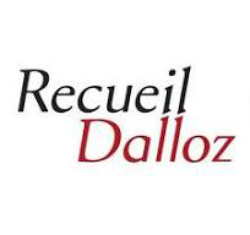
► Full Reference : M.A. Frison-Roche, Le "Grand Arrêt" de la Cour d'appel de Paris du 7 mai 2025, Dalloz et al. c/Forseti, D.2025, p.
____
📝reread the article (in French)
____
► Ench presentation of this article: The first part of the article describes the Paris Court of Appeal's ruling against the company that created a Legaltech platform under the trade name 'Doctrine', which offers a large number of court rulings, particularly from lower courts. Sued for unfair competition by a group of publishers offering a similar service, they were not convicted at first instance, but were convicted by the Court of Appeal because it appeared that they had fraudulently obtained thousands of judgments, which, under Civil Law, constitutes unfair competition to the detriment of the plaintiffs.
The second part of the article draws 6 lessons from this. The power of general law. On the benefits that the perpetrator has derived from the slowness of justice. On the importance of Open Data. On the fact that the law is not mastered by accumulating data but by putting it into perspective through the thinking of authors and publishers. On the indifference for this of the financiers who built and resold the "Doctrine" website. On the very nature of a 'Grand Arrêt', such as this one.
________
Feb. 21, 2025
Conferences
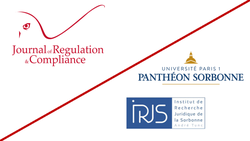
🌐suivre Marie-Anne Frison-Roche sur LinkedIn
🌐s'abonner à la Newsletter MAFR Regulation, Compliance, Law
🌐s'abonner à la Newsletter en vidéo MAFR Surplomb
____
 ► Full Reference: M.-A. Frison-Roche, La qualification juridique du système de noms de domaine comme infrastructure et ses conséquences juridiques ("The legal status of the domain name system as an infrastructure and its legal consequence"), in M.-A. Frison-Roche et G. Loiseau (dir.), Durabilité de l'Internet : le rôle des opérateurs du système des noms de domaine (Sustainability of the Internet: the role of the operators of the domain name system. Compliance and regulation of the digital space). Compliance et régulation de l'espace numérique, 21 février 2025, organisé par le Journal of Regulation & Compliance et l'Institut de la Recherche en Droit de la Sorbonne (André Tunc - IRDJS), 12 place du Panthéon, Paris.
► Full Reference: M.-A. Frison-Roche, La qualification juridique du système de noms de domaine comme infrastructure et ses conséquences juridiques ("The legal status of the domain name system as an infrastructure and its legal consequence"), in M.-A. Frison-Roche et G. Loiseau (dir.), Durabilité de l'Internet : le rôle des opérateurs du système des noms de domaine (Sustainability of the Internet: the role of the operators of the domain name system. Compliance and regulation of the digital space). Compliance et régulation de l'espace numérique, 21 février 2025, organisé par le Journal of Regulation & Compliance et l'Institut de la Recherche en Droit de la Sorbonne (André Tunc - IRDJS), 12 place du Panthéon, Paris.
____
🧮see the full programme of this colloquium (in French)
____
► Summary of this conference: "Domain names" are a technical reality. This technical reality has come to the fore, seeming to have been both little "thought out" and little "conceived" in Law and, perhaps because it is little coveted, Competition Law, which neutralises the concreteness of things and services in order to focus on exchange, hardly qualifies them. It is rather from the 'Competition Policy' perspective that 'domain names' are apprehended. However, Competition Policy expresses wishes and perspectives, while Competition aw must make way for the perspective of Regulatory Law inside the liberal economic system.
Looking at the technicalities of the domain name system, we can proceed in 3 stages.
Firstly, if a domain name is taken in isolation, it may appear as property and/or a projection of a person, and has rightly been described as such by the courts. But domain names only exist in relation to each other, the addressing system on which the Internet itself and the digital space that enables everyone to spread, reach and be reached were built. In this way, they constitute an Infrastructure in their plurality, in a uniqueness (I). The legal system must take account of this technological reality through the concept of Essential Infrastructure, which is well known in Regulatory legal perspective(I).
Secondly, the legal consequences of this legal qualification of Infrastructure must be detailed (II). Regulatory Law does not necessarily imply institutions, a regulatory authority being an indication rather than a criterion. Rather, it requires specific charges, powers and controls to ensure that the Infrastructure is established and operates to fulfill, now and in the future, the function that is crucially expected of it. Because the digital space was born of the Internet, an a-sectional and a-territorial space, Compliance Law, which is an extension of Regulatory Law, outside the sectors and internalised in the crucial operators, is essential as it is appropriate without diminishing the public dimension of the organisation.
Thirdly, the evidential dimension should be emphasised (III). Indeed, because we need to ensure that the Domain Names Infrastructure is always solid and reliable, so as not to risk a systemic failure of the Internet, and therefore of the digital space, we must not remain with the traditional system of burden of proof that rests on the person making the complaint. Because there is a Compliance Obligation, it is up to the crucial operators to credibly show their ability to ensure the technical sustainability of this infrastructure on which the digital space in which we live is based.
It shall be different if the issue is one of non-technical Sustainability, for example that which is linked to a particular societal project, in which the operators of the domain name system are not at the origin and are required on an ad hoc basis because they are in a good position to help the Authorities or because they wish to do so.
_____

Feb. 18, 2025
Publications

🌐follow Marie-Anne Frison-Roche on LinkedIn
🌐subscribe to the Newsletter MAFR Regulation, Compliance, Law
🌐subscribe to the Vide Newsletter MAFR Hangover
____
 ► Full Reference: M.-A. Frison-Roche, The legal status of the domain name system as an infrastructure and its legal consequences, Working paper, February 2025
► Full Reference: M.-A. Frison-Roche, The legal status of the domain name system as an infrastructure and its legal consequences, Working paper, February 2025
____
🎥 This working paper is the basis of the contribution to the symposium co-organised by the Journal of Regulation & Compliance (JoRC) and the Institut de Recherche Juridique de la Sorbonne (André Tunc - IRJS), Durabilité de l'Internet : le rôle des opérateurs du système des noms de domaine. Compliance et régulation de l'espace numérique (Sustainability of the Internet: the role of domain name system operators. Compliance and Regulatory Law in the Digital Space).
____
📝 It will also form the basis of the forthcoming📕.
____
► Summary of this Working Paper: Les "noms de domaine" sont une réalité technique. Cette réalité technique s'est imposée, semblant avoir été à la fois peu "pensée" et peu "conçue" en Droit et, peut-être parce qu'elle fait peu l'objet de convoitise, le Droit de la concurrence qui neutralise la concrétude des choses et prestations pour se concentrer sur l'échange, ne les qualifie guère. C'est plutôt dans une perspective de "politique de concurrence" que les noms de domaine" sont appréhendés. Or, la politique de la concurrence exprime des souhaits et des perspectives, tandis que le Droit de la concurrence doit faire place au sein du système économique libéral à la perspective de Régulation.
► Summary of this Working Paper: "Domain names" are a technical reality. This technical reality has come to the fore, seeming to have been both little "thought out" and little "conceived" in Law and, perhaps because it is little coveted, Competition Law, which neutralises the concreteness of things and services in order to focus on exchange, hardly qualifies them. It is rather from the 'Competition Policy' perspective that 'domain names' are apprehended. However, Competition Policy expresses wishes and perspectives, while Competition aw must make way for the perspective of Regulatory Law inside the liberal economic system.
Looking at the technicalities of the domain name system, we can proceed in 3 stages.
Firstly, if a domain name is taken in isolation, it may appear as property and/or a projection of a person, and has rightly been described as such by the courts. But domain names only exist in relation to each other, the addressing system on which the Internet itself and the digital space that enables everyone to spread, reach and be reached were built. In this way, they constitute an Infrastructure in their plurality, in a uniqueness (I). The legal system must take account of this technological reality through the concept of Essential Infrastructure, which is well known in Regulatory legal perspective(I).
Secondly, the legal consequences of this legal qualification of Infrastructure must be detailed (II). Regulatory Law does not necessarily imply institutions, a regulatory authority being an indication rather than a criterion. Rather, it requires specific charges, powers and controls to ensure that the Infrastructure is established and operates to fulfill, now and in the future, the function that is crucially expected of it. Because the digital space was born of the Internet, an a-sectional and a-territorial space, Compliance Law, which is an extension of Regulatory Law, outside the sectors and internalised in the crucial operators, is essential as it is appropriate without diminishing the public dimension of the organisation.
Thirdly, the evidential dimension should be emphasised (III). Indeed, because we need to ensure that the Domain Names Infrastructure is always solid and reliable, so as not to risk a systemic failure of the Internet, and therefore of the digital space, we must not remain with the traditional system of burden of proof that rests on the person making the complaint. Because there is a Compliance Obligation, it is up to the crucial operators to credibly show their ability to ensure the technical sustainability of this infrastructure on which the digital space in which we live is based.
It shall be different if the issue is one of non-technical Sustainability, for example that which is linked to a particular societal project, in which the operators of the domain name system are not at the origin and are required on an ad hoc basis because they are in a good position to help the Authorities or because they wish to do so.
_____
🔓read the developments below⤵️
Feb. 12, 2025
Thesaurus : 02. Cour de cassation
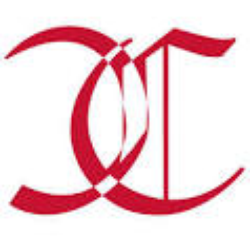
► Référence complète : Com., 12 février 2025, n°23-20.079, M c/ société MDC
____
____
Description de l'arrêt.
Les statuts d'une SAS comprennent une clause d'exclusion d'associé, stipulation qui prévoit une notification préalable au moins 30 jours avant, donnant les motifs et la date de la réunion pour que l'associé puisse faire valoir ses arguments en défense.
En juin 2018, l'associé est convoqué, les motifs communiqués étant le fait qu'il travaillerait en même pour une entreprise concurrence, à une réunion préalable à laquelle il se ne rend pas.
A l'AG de la semaine suivante, l'associé est exclu.
Il attaque en nullité la délibération
Puis en 2019, la société est mise en redressement judiciaire puis liquidée, le litige se poursuivant donc entre l'associé et le liquidateur.
La Cour d' appel de Rouen donne satisfaction à l'associé en estimant que la notification adressée ne mentionnait que le fait de travailler depuis plusieurs années pour une entreprise concurrente ce qui est contraire aux obligations de l'associé, sans préciser ni l'identité de l'entreprise ni l'activité en question ne satisfaisait pas à la stipulation statutaire d'exclusion.
La Chambre commerciale prononce une cassation sur le fondement de l'article 1134 du Code civil selon lequel les conventions tiennent lieu de loi à ceux qui les ont faites. Elle relève en effet que la clause statutaire exige la notification des motifs mais pas de telles précisions.
____
Jan. 7, 2025
Publications
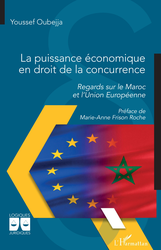
► Référence complète : M.A. Frison-Roche, préface à l'ouvrage de Y. Oubejja,, La puissance économique en droit de la concurrence, L'Harmattan Éditions, coll. "Logiques juridiques", 2025, pp.13-16
____
📝Lire la préface
____
► Présentation de la préface : une préface pouvant prendre plus de champ que ne le prend un ouvrage technique qui traite le thème de la puissance dans le cadre du Droit de la concurrence, la préface aborde le rapport entre le Droit et la puissance, qu'il s'agisse du fait de la puissance ou de la puissance du Droit, rapport dont l'examen remplit les bibliothèques et passionne les philosophes, les politistes et les sociologues.
Dans le Droit de la concurrence, construit sur la Liberté, qu'il s'agit du droit civil de la concurrence ou du droit système des marchés concurrentiel, la puissance est le levier mais devient l'objet du Droit, lorsque, jouxtant la Régulation la puissance devient un objet autonome d'intervention, soit que le passage vers l'Ex Ante se passe à l'occasion, celle d'une concentration, soit du fait d'une situation structurelle, celle d'un secteur. Le Droit des pratiques restrictives prend le gant de la puissance en le retournant par son revers qu'est la dépendance. Des remèdes à ce désir humain de dominer, il y a peu. L'information et la transparence en Ex Ante. Des sanctions, toujours des sanctions, en Ex Post. Des textes, toujours des textes.
________

Updated: Dec. 4, 2024 (Initial publication: Feb. 6, 2024)
Publications

🌐follow Marie-Anne Frison-Roche on LinkedIn
🌐subscribe to the Newsletter MAFR Regulation, Compliance, Law
🌐subscribe to the Video Newsletter MAFR Surplomb
____
 ► Full Reference: M.-A. Frison-Roche, In Compliance Law, the legal consequences for Entreprises of their commitments and undertakings, June 2024.
► Full Reference: M.-A. Frison-Roche, In Compliance Law, the legal consequences for Entreprises of their commitments and undertakings, June 2024.
____
📝 This Working Paper is the basis for the contribution "In Compliance Law, the legal consequences for Entreprises of their commitments and undertakings", in📘Compliance Obligation.
____
► Summary of this Working Paper: The innocents might believe, taking the Law and its words literally, that "commitments" are binding on those who make them. Shouldn't they be afraid of falling into the trap of the 'false friend', which is what the Law wants to protect them from (as stated in the prolegomena)?
Indeed, the innocent persons think that those who make commitments ask what they must do and say what they will do. Yet, strangely enough, the 'commitments' that are so frequent and common in compliance behaviours are often considered by those who adopt them to have no binding value! Doubtless because they come under disciplines other than Law, such as the art of Management or Ethics. It is both very important and sometimes difficult to distinguish between these different Orders - Management, Moral Norms and Law - because they are intertwined, but because their respective standards do not have the same scope, it is important to untangle this tangle. This potentially creates a great deal of insecurity for companies (I).
The legal certainty comes back when commitments take the form of contracts (II), which is becoming more common as companies contractualise their legal Compliance Obligations, thereby changing the nature of the resulting liability, with the contract retaining the imprint of the legal order or not having the same scope if this prerequisite is not present.
But the contours and distinctions are not so uncontested. In fact, the qualification of unilateral undertaking of will is proposed to apprehend the various documents issued by the companies, with the consequences which are attached to that, in particular the transformation of the company into a 'debtor', which would change the position of the stakeholders with regard to it (III).
It remains that the undertakings expressed by companies on so many important subjects cannot be ignored: they are facts (IV). It is as such that they must be legally considered. In this case, Civil Liability will have to deal with them if the company, in implementing what it says, what it writes and in the way it behaves, commits a fault or negligence that causes damage, not only the sole existence of an undertaking.
_____
🔓read the developments below ⤵️
Nov. 27, 2024
Publications
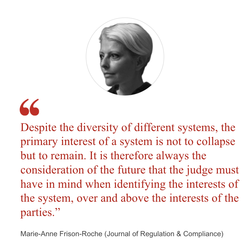
🌐follow Marie-Anne Frison-Roche on LinkedIn
🌐subscribe to the Newsletter MAFR Regulation, Compliance, Law
🌐subscribe to the Newsletter Surplomb, par MAFR
____
► Full Reference: M.-A. Frison-Roche, "Antitrust, natural field of systemic litigation"", Concurrences, November 2024, No. 4, Art. No. 120776.
____
📝read the article (in English)
____
🚧read the bilingual Working Paper which is the basis of this article, with additional developments, technical references and hyperlinks
____
► English Summary of this article: Systemic Litigation is a specific category of Litigation in which beyond the dispute between the parties the interest of a System is involved, in particular its future. Competition Law is a natural and long-standing field for this category, which is now emerging strongly for information, climate and energy systems.
It should be remembered that a market is not self-regulating and cannot continue to function in the long term unless it has the benefit of a judge, a figure who is specific in that he/she is both external to it and yet apprehends its specific interest. In order to satisfy this double requirement, liberal legal organisations often entrust the competition authority with jurisdiction over this Systemic Litigation. Ordinary courts will also hear such cases, either on appeal or in other proceedings, and it cannot be claimed that courts are excluded, the systemic dimension of the dispute being expressed by the presence of the competition authority in the proceedings. This explains the procedural rules that are hard to justify otherwise.
The Authority, the European Commission for example, must be able to develop and express the specific interests of the competition system. This special role of the competition authority in this type of litigation, because it is systemic, has been in place for decades and should serve as a model for Systemic Litigation, which is being developed for other systems whose sustainability is now referred to the courts.
________
Nov. 5, 2024
Publications

🌐follow Marie-Anne Frison-Roche on LinkedIn
🌐subscribe to the Newsletter MAFR Regulation, Compliance, Law
____
► Full Reference: M.-A. Frison-Roche, "Naissance d'une branche du Droit : le Droit de la Compliance" ("Birth of a branch of Law: Compliance Law"), in Mélanges offerts à Louis Vogel. La vie du droit, LexisNexis - Dalloz - LawLex - LGDJ, 2024, pp.177-188.
____
📝read the article (in French)
____
____
► English Summary of the article: The study focuses on the various movements that have given rise to Compliance Law, with particular emphasis on Competition Law.
After a preliminary reflection on the construction of the legal system into branches of Law, their classification in relation to each other, the difficulty encountered in this respect by Economic Law, and the various movements that give rise to one of them, the diversity of which the branch subsequently keeps track of, the study is constructed in 4 parts.
To find out what gave rise to Compliance Law, the first part invites everyone to reject the narrow perspective of a definition that is content to define it by the fact of "complying" with the applicable regulations in the sens to obey them automatically. This has the effect of increasing the effectiveness of the regulations, but it does not produce a branch of Law, being only an efficiency tool like any other.
The second part of the study aims to shed light on what appears to be an "enigma", because it is often claimed that this is the result of a flexible method through the "soft law", or of an American regulation (for instance FCPA), or of as many regulations as there are occasions to make. Instead, it appears that in the United States, in the aftermath of the 1929 crisis, it was a question of establishing an authority and rules to prevent another atrocious collapse of the system, while in Europe, in 1978, in memory of the use of files about Jews, it was a question of establishing an authority and rules to prevent an atrocious attack on human rights. A common element that aims for the future ("never again"), but not the same object of preventive rejection. This difference between the two births explains the uniqueness and diversity of the two Compliance Law, the tensions that can exist between the two, and the impossibility of obtaining a global Compliance Law.
The third part analyses the way in which Competition Law has given rise to conformity mechanisms: they had only constituted a secondary branch which is a guarantee of conformity with competition regulations. Developed in particular through the soft law issued by the competition authorities, the result is a kind of "soft obedience", a well-understood collaboration of a procedural type through which the company educates, monitors and even sanctions, without going outside Competition Law, of which compliance (in the sens of conformity) is the appendix. The distance between a conformity culture and Compliance Law can be measured here.
The fourth part aims to show that Competition Law and Compliance Law are two autonomous and articulated branches of Law. Since Compliance Law is a autonomous and strong branch of Law built around Monumental Goals, in particular the sustainability of systems and the preservation of the human beings involved so that they are not crushed by these systems but benefit from them : the current challenge of European integration is to build the pillar of Compliance Law alongside the competitive pillar. Jurisdictions are in the process of doing this and articulating them.
________
Oct. 29, 2024
Thesaurus : Doctrine

► Référence complète : Mélanges offerts à Louis Vogel. La vie du droit, LexisNexis - Dalloz - LawLex - LGDJ, 2024, 828 p.
____
____
📗lire la table des contributions
____
► Présentation de l'ouvrage (faite par l'éditeur) : "Le droit est une matière vivante qui organise le monde réel et, comme Louis Vogel, évolue sans cesse.
Guidé par sa très forte envie d’agir, Louis Vogel a, dans chaque partie de sa vie professionnelle, fortement fait progresser la situation qu’il a trouvée à l’origine.
À l’Université, il apporte une contribution décisive, d’abord comme professeur, au travers de ses nombreux ouvrages et des masters qu’il a fondés et dirigés, notamment en droit économique français et européen ; ensuite, comme président de l’université Panthéon-Assas et président de France Universités, il réforme en profondeur, saisissant toujours toutes les opportunités.
Comme avocat, aux côtés de son frère Joseph, il fonde un cabinet spécialisé en droit de la concurrence, qui conseille les plus grands noms du secteur de l’automobile, de l’audiovisuel, de la distribution… et qui, dans de nombreuses affaires, fait évoluer la jurisprudence. Toujours ouvert aux nouveautés, Louis Vogel travaille, en parallèle, sur l’application de l’intelligence artificielle au droit.
En politique, comme maire et président de l’agglomération de Melun puis, plus récemment, comme sénateur, il poursuit son action au service de la collectivité et, après, en tant que professeur, avoir enseigné le droit et, en tant qu’avocat, l’avoir appliqué, désormais, en tant que sénateur, il le crée.
Convaincu que la liberté, la prudence et la confiance conditionnent la réussite, Louis Vogel a, durant toutes ces années, accompagné, et souvent, anticipé les mutations de notre société. La richesse et la diversité des articles composant ses Mélanges démontrent qu’il a transmis à ceux qui ont cheminé avec lui cette curiosité et cette humanité."
____
📝lire une présentation de l'article de Marie-Anne Frison-Roche : "Naissances d'une branche du Droit : le Droit de la Compliance"
________

Oct. 25, 2024
MAFR TV : MAFR TV - Overhang
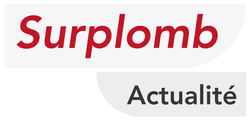
🌐suivre Marie-Anne Frison-Roche sur LinkedIn
🌐s'abonner à la Newsletter MAFR. Regulation, Compliance, Law
🌐s'abonner à la Newsletter Surplomb, par MAFR
____
► Référence complète : M.-A. Frison-Roche, "Cumul et articulation Droit spécial de la Compliance et Droit commun de la concurrence déloyale : l’arrêt de la CJUE du 4 octobre 2024 ND/DR", in série de vidéos Surplomb, 25 octobre 2024
____
🌐visionner sur LinkedIn cette vidéo de la série Surplomb
____
____
► Résumé de ce Surplomb : Sur question préjudicielle, la décision ND c/ DR de la CJUE du 4 octobre 2024 articule le Droit de la concurrence déloyale et protection des données, qui croise la vente de médicaments sur Internet.... Un pharmacien prend des informations personnelles sur la santé des acheteurs, un concurrent se plaint d'une violation du RGPD qui constitue un détournement de clientèle. Le RGPD n'ouvre pas une telle action. Ne la ferme pas non plus.
Bien que la protection des données soit assurée par des organes nationaux spéciaux et qu'il s'agit de protéger des droits spécifiques des personnes protégées, la Cour pose qu'un tiers peut se baser sur un tel comportement pour se situer sur le droit commun pour s'en plaindre, en tant qu'il est concurrent et qu'il peut alléguer que cela constitue un acte de concurrence déloyale.
Pour affirmer cela, Cour souligne qu'en premier lieu le RGPD ne confère pas de compétence exclusive et que d'autre part la convergence des actions renforce le Droit de l'Union car le RGPD vise aussi le flux des données, principe de liberté que protège aussi le droit de la concurrence déloyale, qui s'applique selon les conditions du droit (faute qualité, dommage, causalité).
____
🚧Lire le document de travail sous-jacent à ce Surplomb
____
🎬visionner ci-dessous cette vidéo de la série Surplomb⤵️
____
Surplomp, par mafr
la série de vidéos dédiée à la Régulation, la Compliance et la Vigilance
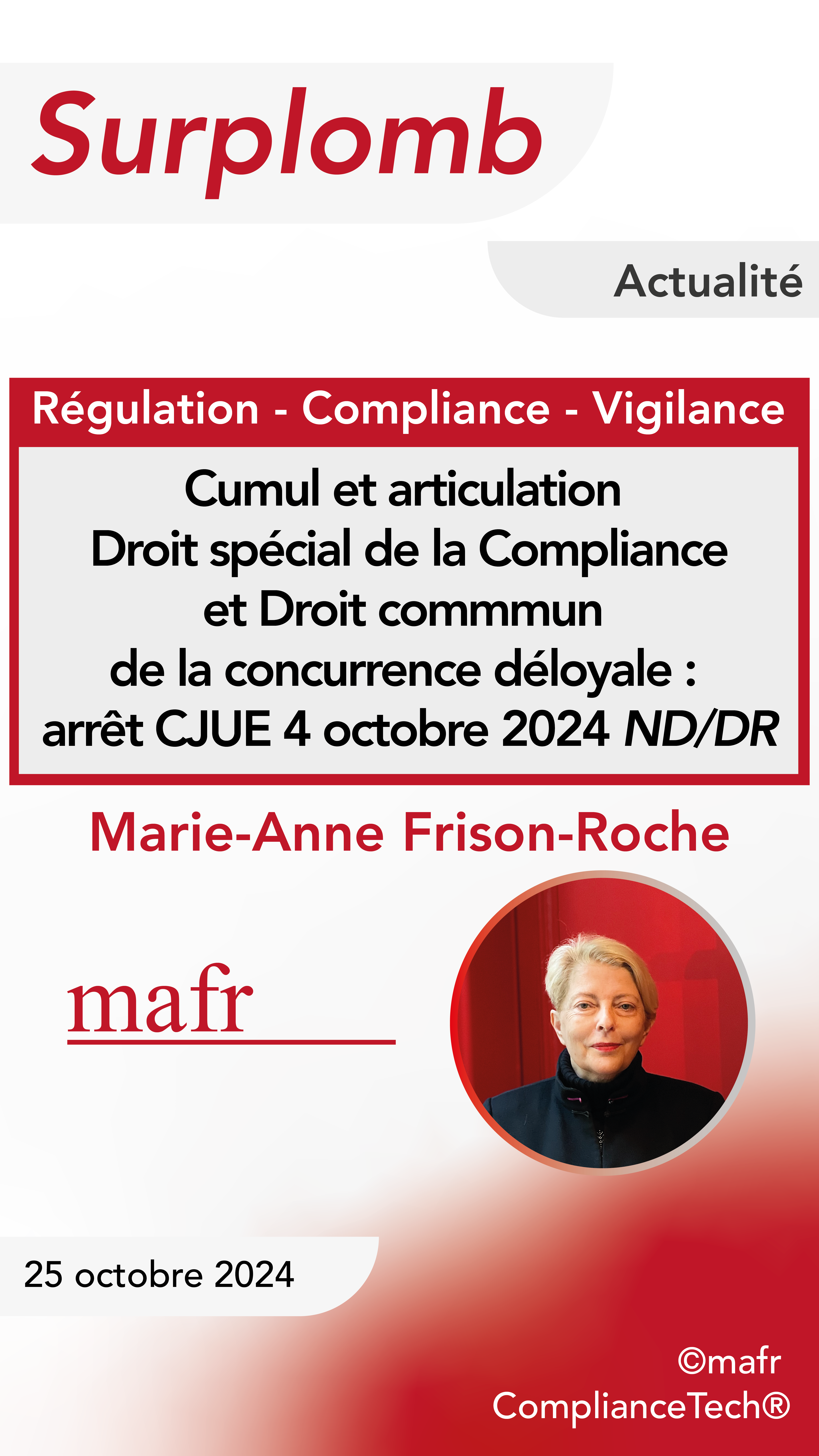

Oct. 4, 2024
Thesaurus : 05. CJCE - CJUE
► Référence complète : CJUE, Grande chambre, 4 octobre 2024, aff. C-21/23, ND c/ DR
____
________
Sept. 24, 2024
Thesaurus : 02. Cour de cassation
Sept. 9, 2024
Thesaurus : Doctrine
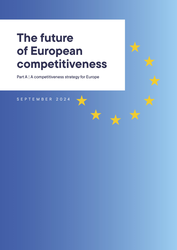
► Référence complète : M. Draghi, The future of European competitiveness, rapport, septembre 2024, 397 p., dit "rapport Draghi"
____
📓lire la première partie du rapport Draghi, A competitiveness strategy for Europe
► Référence complète : M. Draghi, The future of European competitiveness. Part A - A competitiveness strategy for Europe, rapport, septembre 2024, 69 p.
____
📓lire la seconde partie du rapport Draghi, In-depth analysis and recommendations
► Référence complète : M. Draghi, The future of European competitiveness. Part B - In-depth analysis and recommendations, rapport, septembre 2024, 328 p.
________

Aug. 2, 2024
Publications

🌐follow Marie-Anne Frison-Roche sur LinkedIn
🌐subscribe to the Newsletter MAFR Regulation, Compliance, Law
🌐subscribe to the Video Newsletter MAFR Surplomb
____
 ► Full Reference: M.-A. Frison-Roche, Antitrust, natural field of Systemic Litigation, Working Paper, July 2024
► Full Reference: M.-A. Frison-Roche, Antitrust, natural field of Systemic Litigation, Working Paper, July 2024
____
📝This working paper has been prepared as a basis for the article to be published "Antitrust, natural field of Systemic Litigation" in the Review Concurrences in September 2024
____
► Summary of this Working Paper: Systemic Litigation is a specific category of Litigation in which beyond the dispute between the parties the interest of a System is involved, in particular its future. Competition Law is a natural and long-standing field for this category, which is now emerging strongly for information, climate and energy systems.
It should be remembered that a market is not self-regulating and cannot continue to function in the long term unless it has the benefit of a judge, a figure who is specific in that he/she is both external to it and yet apprehends its specific interest. In order to satisfy this double requirement, liberal legal organisations often entrust the competition authority with jurisdiction over this Systemic Litigation. Ordinary courts will also hear such cases, either on appeal or in other proceedings, and it cannot be claimed that courts are excluded, the systemic dimension of the dispute being expressed by the presence of the competition authority in the proceedings. This explains the procedural rules that are hard to justify otherwise.
The Authority, the European Commission for example, must be able to develop and express the specific interests of the competition system. This special role of the competition authority in this type of litigation, because it is systemic, has been in place for decades and should serve as a model for Systemic Litigation, which is being developed for other systems whose sustainability is now referred to the courts.
____
🔓read the developments below⤵️
June 6, 2024
Editorial responsibilities : Direction of the collection "Cours-Série Droit privé", Editions Dalloz (33)
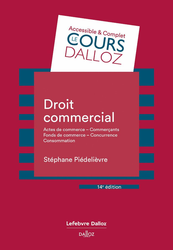
► Référence complète : S. Piédelièvre, Droit commercial (Actes de commerce - Commerçants - Fonds de commerce - Concurrence - Consommation), Dalloz, coll. "Cours Dalloz-Série Droit privé", 1ière éd., 1997, 14ième éd., 2024, 480 p.
____
► Présentation générale de l'ouvrage : Cet ouvrage, qui s’adresse principalement aux étudiants de L2 et L3, propose une approche claire et détaillée de la notion de commercialité. Il intéressera également les praticiens souhaitant actualiser leurs connaissances en droit commercial.
Complexe dans le système français, cette notion suscite de nombreuses questions appelant des solutions concrètes d’une grande importance comme les régimes de compétence et de preuve. Cet ouvrage aborde la question du droit commercial à travers les actes de commerce, les commerçants, les fonds de commerce, ainsi que la concurrence et la consommation.
L’auteur s’est appliqué à présenter les règles qui constituent les principes de l’activité marchande.
____
📕lire la quatrième de couverture
____
____
📚consulter l'ensemble de la collection dans lequel l'ouvrage a été publié
________